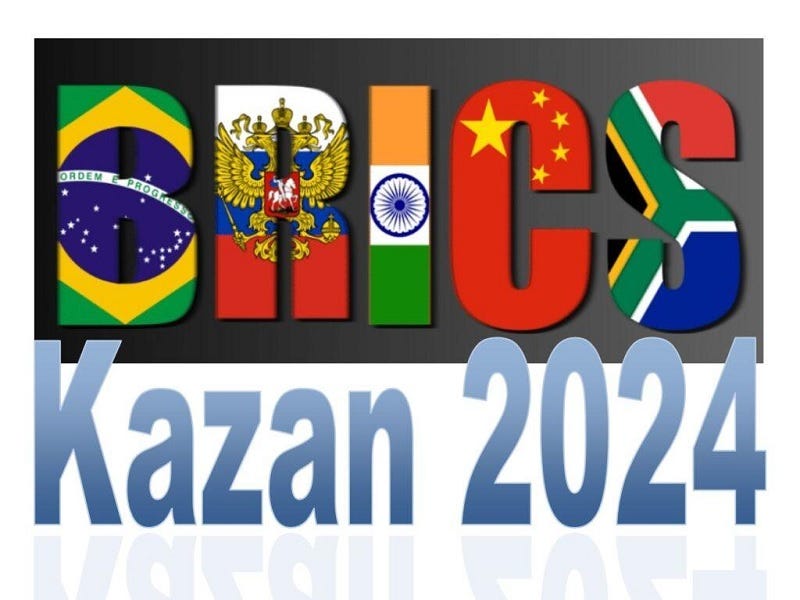Russia only intends to signal prestige by inviting the leaders of three friendly organizations like the SCO and didn’t do this just to invite Pakistan or suggest that Moscow supports Islamabad’s request to expedite its membership bid.
Chairman of the Pakistani Defense Committee Mushahid Hussain Sayed’s trip to Russia last month and his expression of hope for its support in obtaining expedited membership in BRICS during this year’s Kazan Summit made some in India wonder their strategic partner will approve their rival’s request. In response to the new Pakistan Ambassador to Russia’s similar such hopes last November, it was assessed that “Russia Will Only Extend Perfunctory Support For Pakistan’s Membership In BRICS”.
The basis upon which the preceding prediction was made is that Russia won’t risk offending its decades-long special and privileged Indian strategic partners with whom it’s jointly accelerating tri-multipolarity processes in the two years since the special operation started. This expectation still holds even after Russian Presidential Aide Yury Ushakov told TASS on Monday that his country will invite the CIS, Eurasian Economic Union (EAEU), and SCO states’ leaders to this year’s “Outreach”/“BRICS Plus” Summit.
Seeing as how Pakistan is an SCO member, returning Pakistani Prime Minister Shehbaz Sharif will probably appear at that event upon receiving the promised invitation, thus possibly prompting a renewed wave of speculation about whether Russia backs his country’s expedited membership bid. India’s feathers shouldn’t be ruffled by this development, however, since Russia only intends to signal prestige by inviting the leaders of those three organizations and didn’t do this just to invite Sharif.
To explain, Ushakov told TASS that the “[‘Outreach’/’BRICS Plus’] is an ad hoc platform, where the leaders of states keen to make their own constructive contribution to the discussion of crucial issues on the international and regional agendas are invited to the BRICS summits.” Host countries can invite whoever they want, such as members of regional integration organizations like South Africa’s invitation to all the African Union’s ones last year, which established the precedent that Russia plans to follow.
The CIS and EAEU are indisputably Russian-led organizations, while some have claimed in recent years that the SCO is de facto a Chinese-led one, but Russia’s invitation to its leaders to attend this year’s “Outreach”/“BRICS Plus” Summit is gently intended to challenge that notion. By doing so, Moscow is reassuring Delhi that their shared organization doesn’t have a leader no matter what others have claimed, with Russia regarding itself as an equal member on par with China and all others.
The EAEU includes Russia, Armenia, Belarus, Kazakhstan, and Kyrgyzstan, while the CIS counts those five as members alongside Azerbaijan, Tajikistan, and Uzbekistan, with Turkmenistan being an associate. Extending invitations to the SCO leaders is therefore redundant since most of the aforesaid countries comprise the bulk of this group whereas China, India, and Iran are already part of BRICS. The exception is Pakistan, which is why some speculate that this invite was aimed at signaling support for its BRICS bid.
The reality is that declining to redundantly invite the SCO leaders could have been maliciously spun by hostile forces as suggesting that “Russia recognizes that China leads the SCO and is therefore tacitly ceding influence within it to the People’s Republic”. That isn’t true whatsoever at all as was earlier explained, but the only way to preemptively avert that predictable information warfare provocation was to redundantly invite the SCO leaders and therefore let returning Pakistani Prime Minister Sharif attend.
Far from having their feathers ruffled, Indians should appreciate the signal being sent by Russia through these means since it shows that their decades-long special and privileged strategic partner is sensitive to false claims that the SCO has become a de facto Chinese-led group. India’s redoubling of ties with Russia since the special operation started was aimed at preemptively averting that country’s potentially disproportionate dependence on China, and this latest move proves that its policy succeeded.




